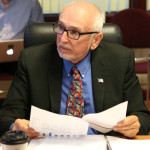Idaho school boards are responsible for implementing state laws, managing more than $1.5 billion of state education dollars, supervising school leaders and promoting the academic success of all Idaho children.
Those boards’ elected trustees receive no compensation or required training.
The Idaho School Boards Association, a dues-paying membership organization, provides governing services, networking and training. But some trustees from Idaho’s largest districts are questioning the ISBA’s value and considering pulling out.

“At this point, there are no other options, but I’ll be evaluating their services this year,” said Travis Manning, a newly elected Caldwell School District trustee.
Caldwell trustees voted 4-1 this summer to continue their ISBA membership for another year, but not without discussions about cost and value.
“I’m willing to listen to what they have and evaluate their service but it’s a lot of money and a lot of expense,” Manning said. “My mind is open. I have no prediction of what will happen next year.”
West Ada School District trustee Russell Joki questioned the value of the ISBA membership during a summer board meeting.

“If I had my way, yes,” Joki said of the idea of pulling out of the ISBA and redirect taxpayer dollars.
With only one exception, all of Idaho’s 115 school districts are ISBA members. North Idaho’s Mullan School District hasn’t been a member for at least 10 years.
Losing West Ada or Caldwell would have a big financial impact on the ISBA and its eight full-time employees, executive director Karen Echeverria said. But it’s typical to have newly elected trustees raise questions.
“We’ve reached out and are communicating with most of them,” Echeverria said. “We reach out to every new board member to educate them on what we can provide.”
The cost of membership
Each district pays a different amount to join the ISBA, based on student population and operational costs. Some services require additional costs.
The Boise School District pays the largest annual dues of $37,560 followed by the West Ada’s $35,345.
“The best value we get is the opportunity to connect and network with other districts,” said Nancy Gregory, Boise’s board president. “We collaborate with the ISBA but sometimes we stand in opposition.”
Caldwell’s annual dues come to about $10,100.
Every district pays at least $1,000 per year. Small districts such as Salmon River, Midvale and Horseshoe Bend pay close to $1,300.
Last year, ISBA members invited charter schools to become full members of the organization. Most have joined, paying annual costs of about $1,000 each.
“It takes some time for trustees to learn about what we provide,” Echeverria said. “The best thing we can do is get them to the convention.”
ISBA’s main event is its annual convention, where nearly 500 trustees, board clerks and superintendents attend. Since trustee turnover is high, veterans see many new faces.
“I went to the summer institute and more than 75 percent in attendance were on their board less than three years,” Gregory said.
The three-day convention bounces from Boise to Coeur d’Alene — this November it will be held in North Idaho. The convention includes training, workshops and networking. It’s also when officers are elected and members vote for resolutions they want to push at the Legislature.
“We’ve had excellent success with legislation and very high passage rate,” said Echeverria. “One thing we haven’t been able to change is the super-majority required for passing bonds.”
The ISBA’s services
The ISBA is a support group for elected trustees who have a variety of responsibilities — such as hiring, supervising and firing district superintendents, who often serve as the CEO of the community’s largest employer.
Not surprisingly, it’s often difficult to find candidates to run. Garden Valley has an open seat with no candidates and the Blaine School District is advertising for interested candidates in its regular newsletter.
“It’s a very demanding job for a volunteer and requires a lot of time,” Gregory said. “There’s quite a bit of turnover.”
Though Echeverria says she spends 65 percent of her time lobbying on behalf of school boards during the legislative session, the rest of her staff serves trustees with training and legal responsibilities.
“We work to give them what they need,” she said.
Baseline dues cover training, liability insurance and four hours of legal services. ISBA trainers are positioned around the state and will travel to train trustees.
“I have found value in some (training) and not others,” said Doug Park, a Boise School District trustee.
Districts are required to pay extra for help with superintendent searches, a job description manual and policies.
The ISBA charges $495 a year to draft model policies.
“That’s probably the most important service we provide,” Echeverria said. “It’s a huge liability.”
Boards are required to approve and update all district policies, ranging from dress codes to student behavior to financial management to community relations. All board policies must comply with state and federal laws and follow guidelines established by the Legislature and State Board of Education.
“We draft policies four times a year,” Echeverria said. “Some districts have no policies or they haven’t been updated in years.”
Larger districts such as Boise draft their own policies because they have the money to hire attorneys. Typically, smaller districts rely on the ISBA.
While new West Ada trustee Joki questions the value of an ISBA membership, longtime West Ada trustee Mike Vuittonet defended the membership. He said districts need the group’s lobbying power. West Ada especially needs it for the 2016 legislative session when the ISBA will press for the need for bond relief to compensate districts for growth.
“It’s important we stay members,” said Vuittonet, who plans to run for president of the ISBA at the November convention.
Said Joki: “The needs of large districts are different, and if ISBA cannot represent those needs, such as lobbying for a growth factor in school funding, then I am not convinced membership is worthwhile.”
